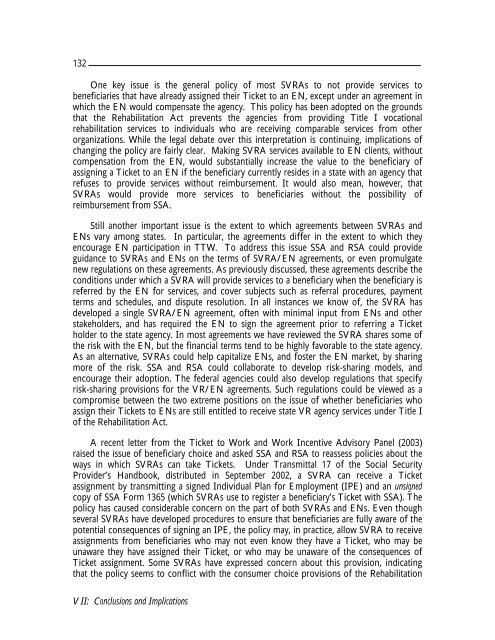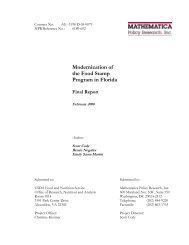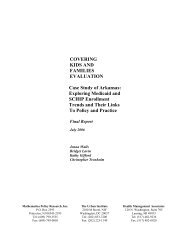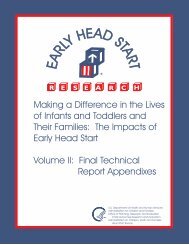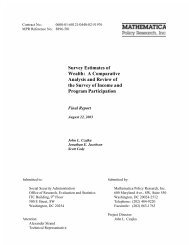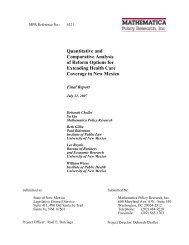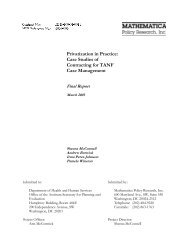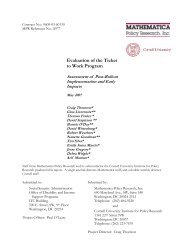Evaluation of the Ticket to Work Program Initial Evaluation Report
Evaluation of the Ticket to Work Program Initial Evaluation Report
Evaluation of the Ticket to Work Program Initial Evaluation Report
You also want an ePaper? Increase the reach of your titles
YUMPU automatically turns print PDFs into web optimized ePapers that Google loves.
132<br />
One key issue is <strong>the</strong> general policy <strong>of</strong> most SVRAs <strong>to</strong> not provide services <strong>to</strong><br />
beneficiaries that have already assigned <strong>the</strong>ir <strong>Ticket</strong> <strong>to</strong> an EN, except under an agreement in<br />
which <strong>the</strong> EN would compensate <strong>the</strong> agency. This policy has been adopted on <strong>the</strong> grounds<br />
that <strong>the</strong> Rehabilitation Act prevents <strong>the</strong> agencies from providing Title I vocational<br />
rehabilitation services <strong>to</strong> individuals who are receiving comparable services from o<strong>the</strong>r<br />
organizations. While <strong>the</strong> legal debate over this interpretation is continuing, implications <strong>of</strong><br />
changing <strong>the</strong> policy are fairly clear. Making SVRA services available <strong>to</strong> EN clients, without<br />
compensation from <strong>the</strong> EN, would substantially increase <strong>the</strong> value <strong>to</strong> <strong>the</strong> beneficiary <strong>of</strong><br />
assigning a <strong>Ticket</strong> <strong>to</strong> an EN if <strong>the</strong> beneficiary currently resides in a state with an agency that<br />
refuses <strong>to</strong> provide services without reimbursement. It would also mean, however, that<br />
SVRAs would provide more services <strong>to</strong> beneficiaries without <strong>the</strong> possibility <strong>of</strong><br />
reimbursement from SSA.<br />
Still ano<strong>the</strong>r important issue is <strong>the</strong> extent <strong>to</strong> which agreements between SVRAs and<br />
ENs vary among states. In particular, <strong>the</strong> agreements differ in <strong>the</strong> extent <strong>to</strong> which <strong>the</strong>y<br />
encourage EN participation in TTW. To address this issue SSA and RSA could provide<br />
guidance <strong>to</strong> SVRAs and ENs on <strong>the</strong> terms <strong>of</strong> SVRA/EN agreements, or even promulgate<br />
new regulations on <strong>the</strong>se agreements. As previously discussed, <strong>the</strong>se agreements describe <strong>the</strong><br />
conditions under which a SVRA will provide services <strong>to</strong> a beneficiary when <strong>the</strong> beneficiary is<br />
referred by <strong>the</strong> EN for services, and cover subjects such as referral procedures, payment<br />
terms and schedules, and dispute resolution. In all instances we know <strong>of</strong>, <strong>the</strong> SVRA has<br />
developed a single SVRA/EN agreement, <strong>of</strong>ten with minimal input from ENs and o<strong>the</strong>r<br />
stakeholders, and has required <strong>the</strong> EN <strong>to</strong> sign <strong>the</strong> agreement prior <strong>to</strong> referring a <strong>Ticket</strong><br />
holder <strong>to</strong> <strong>the</strong> state agency. In most agreements we have reviewed <strong>the</strong> SVRA shares some <strong>of</strong><br />
<strong>the</strong> risk with <strong>the</strong> EN, but <strong>the</strong> financial terms tend <strong>to</strong> be highly favorable <strong>to</strong> <strong>the</strong> state agency.<br />
As an alternative, SVRAs could help capitalize ENs, and foster <strong>the</strong> EN market, by sharing<br />
more <strong>of</strong> <strong>the</strong> risk. SSA and RSA could collaborate <strong>to</strong> develop risk-sharing models, and<br />
encourage <strong>the</strong>ir adoption. The federal agencies could also develop regulations that specify<br />
risk-sharing provisions for <strong>the</strong> VR/EN agreements. Such regulations could be viewed as a<br />
compromise between <strong>the</strong> two extreme positions on <strong>the</strong> issue <strong>of</strong> whe<strong>the</strong>r beneficiaries who<br />
assign <strong>the</strong>ir <strong>Ticket</strong>s <strong>to</strong> ENs are still entitled <strong>to</strong> receive state VR agency services under Title I<br />
<strong>of</strong> <strong>the</strong> Rehabilitation Act.<br />
A recent letter from <strong>the</strong> <strong>Ticket</strong> <strong>to</strong> <strong>Work</strong> and <strong>Work</strong> Incentive Advisory Panel (2003)<br />
raised <strong>the</strong> issue <strong>of</strong> beneficiary choice and asked SSA and RSA <strong>to</strong> reassess policies about <strong>the</strong><br />
ways in which SVRAs can take <strong>Ticket</strong>s. Under Transmittal 17 <strong>of</strong> <strong>the</strong> Social Security<br />
Provider’s Handbook, distributed in September 2002, a SVRA can receive a <strong>Ticket</strong><br />
assignment by transmitting a signed Individual Plan for Employment (IPE) and an unsigned<br />
copy <strong>of</strong> SSA Form 1365 (which SVRAs use <strong>to</strong> register a beneficiary’s <strong>Ticket</strong> with SSA). The<br />
policy has caused considerable concern on <strong>the</strong> part <strong>of</strong> both SVRAs and ENs. Even though<br />
several SVRAs have developed procedures <strong>to</strong> ensure that beneficiaries are fully aware <strong>of</strong> <strong>the</strong><br />
potential consequences <strong>of</strong> signing an IPE, <strong>the</strong> policy may, in practice, allow SVRA <strong>to</strong> receive<br />
assignments from beneficiaries who may not even know <strong>the</strong>y have a <strong>Ticket</strong>, who may be<br />
unaware <strong>the</strong>y have assigned <strong>the</strong>ir <strong>Ticket</strong>, or who may be unaware <strong>of</strong> <strong>the</strong> consequences <strong>of</strong><br />
<strong>Ticket</strong> assignment. Some SVRAs have expressed concern about this provision, indicating<br />
that <strong>the</strong> policy seems <strong>to</strong> conflict with <strong>the</strong> consumer choice provisions <strong>of</strong> <strong>the</strong> Rehabilitation<br />
VII: Conclusions and Implications


